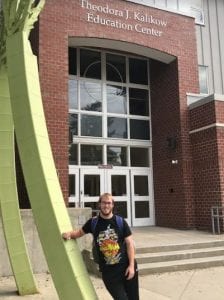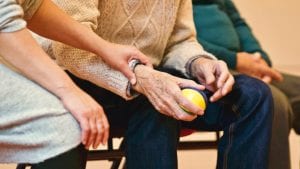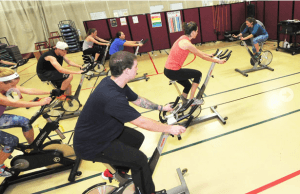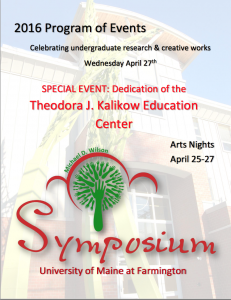Category Archives: Community Health Programs
Student Spotlight: Introducing Justin Davis
We had the pleasure of sitting down with Justin Davis to discuss his schooling experience and what brought him to aspire to become a school health educator. Justin is a junior at UMF and graduated from Washburn High School. Justin is in the Secondary Education practicum this semester, where he will be able to experience the classroom for the first time, which is exciting yet nerve-wracking for the pre-service educator.
Justin Davis
Class of 2020
Community Health Education- School Health
Washburn District High School
Washburn, Maine

UMF College of Education, Health, and Rehabilitation: What is the most exciting thing that you have experienced so far at UMF, and how will that come into play as a pre-service gym/health teacher?
Justin: I think the most exciting thing about UMF is being in the community. The amount of diversity that this campus has to offer along with the feeling of community and togetherness. Having been here for a few years, I realize that it is possible to create a similar positive community in the classroom. Being part of such a great community, I know that in my future learning community my students can become besties, as I have experienced with my peers in my Secondary Education Practicum block this fall.
UMF CEHR: What brought you to UMF and why did you choose community health?
Justin: I started at Northern Maine Community College and from there I completed some of my general education credits to see if I was capable of handling college. I realized, that in fact, I was very capable of handling a four-year university and really wanted to pursue that path. I knew that I wanted to attend UMF because my step mother went here for community health and found great success after graduation. I realized that with a community health degree there is a lot of opportunities and the faculty will direct you to your passions. Community health has a broad spectrum and I knew that with this degree I could become a gym teacher like I have always wanted to. Coming to UMF made me realize I was capable of college and becoming a gym/health teacher. There is always room for flexibility within community health. If I decided that education was not for me, I could always take another route within community health and I am glad that I have that opportunity.
UMF CEHR: Who is really influential in your life and how did they inspire you to become a teacher?
Justin: A lot of people in my life influenced me to become a teacher. I cannot really pinpoint one person. My parents, camp counselors, and teachers were all good influences on my life. They all influenced me and seemed to recognize that I could handle situations that a teacher could be in, and helped me figure out what direction I wanted to go in. All of the people who influenced me helped me recognize that I was capable of becoming a teacher and that is when I believed that I was able to do it.
UMF CEHR: What do you hope to gain from your program?
Justin: I want to gain knowledge and skills to be able to teach to the best of my ability. To know my concentration facts and to continuously engaged in research every year. If I see someone [former student] on the street who has a question about health, I want to be able to put them in the right direction and correctly answer their question.
UMF CEHR: If you could ask a question to an alumni from Community Health (School Health), what would you want to know about post-UMF life?
Justin: I guess it would be how easy was it to get a job, because they don’t really have many options. Given the limited amount of spots a school offers for health and gym educators, it can be difficult to find a job. A school can have 3-4 English/Language Arts educators, but there is only 1-2 gym/health educators, which makes the job market tighter.
UMF CEHR: Can you explain your role at the Fitness and Recreation Center (FRC) and how that helps you improve on your knowledge as a Community Health major?
Justin: At the FRC, I am the student leader of the building attendants which is the bridge from the regular building attendants to the supervisors. For my role, I have to know a lot about the tools and activities that happen at the FRC and activities. I know how all of the tools and equipment operate, the group fitness schedule, and communicating with the building attendants.
UMF’s Rehabilitation Services Degree- What You Need To Know!
The Rehabilitation Services degree offered at the University of Maine at Farmington is a hands on human service degree aimed for those individuals who wish to help people with at-risk conditions to function in their daily living, learning and working environments. If you have a passion for helping others in any population, this degree will help prepare you to make a huge difference in the lives of those in need. (Retrieved from http://www2.umf.maine.edu/advising/about/explore-majors-at-umf/rehabilitation-services/)
After fulfilling the 56 credit hour major requirements and three program electives, you will have a greater understanding of the field of human services, the helping relationship, and counselor characteristics. Students who complete the required courses listed here will receive a Bachelor of Science in Rehabilitation Services.
Along with this degree, students have an opportunity to get their Mental Health Rehabilitation Technician (MHRT/Community) Certification. The courses that are required to be eligible for this certificate are:
- REH 249 Psychosocial Rehabilitation
- REH 270 Vocational Counseling and Placement
- REH 320 Addiction Rehabilitation
- REH 420 Trauma and Resiliency
For more information about this certificate, click here.
So what exactly can you do with a Rehabilitation Services degree? Here are some jobs that UMF graduates have obtained with this major:
Licensed Social Worker: these professionals help people with a broad range of issues, including psychological, financial, health, relationship, and substance abuse problems. As well, they help to improve the lives of others and society together.
Guidance Counselor: their duties are to work with students and parents to help guide students through their transition of academics, behaviors, and growth. Guidance counselors can work in elementary schools, middle schools, and high schools.
 Occupational Therapist: these professionals help to improve the lives of individuals with their daily life skills. These individuals may have physical, social, mental, or developmental disabilities.
Occupational Therapist: these professionals help to improve the lives of individuals with their daily life skills. These individuals may have physical, social, mental, or developmental disabilities.
Substance Abuse Counselor: their duties are to work with individuals who may have a dependency on drugs or alcohol and to help them overcome the addiction by seeking a treatment plan. As well, substance abuse counselors get their clients back into a healthier transition and obtain goals they wish to pursue after treatment.
If you have a passion for working with individuals, and want to give back to those in need, then the degree Rehabilitation Services would be a great fit for you! To learn about more information about this degree, and all other minor requirements and certificates offered, visit the Rehabilitation Services page as well as the Course Catalog!
Ready, Set, the Academic Year is Here! We’re Ready, Here’s How You Can Be, Too!
Welcome back to UMF, beavers! We are so excited to have everyone back on campus as the academic year is kickstarting! As you begin this year, take time to reflect on yourself. What things you do well as a student? How can you improve as a student and a learner? Having a few months off from school is difficult, but we are here to give you advice on how to handle the transition like a champ, and to be ahead of the game!
1. Organization
Planning out your days is a huge life saver. Carrying and using a planner to help track your classes and accumulated coursework will make your time at the library more productive. Keeping track of your syllabus and highlighting due dates will keep you in the know. This way, when things come up you are able to handle the stress because you’re aware of your deadlines. Organization is one of the best ways to manage your stress. Click on some of the great apps that can help you stay on your game!



2. Stick to Your Plan
Having a daily plan is really important because everyone’s schedules can become so crazy that some days it feels difficult to catch a breath. That’s why creating a “to-do” list or having a handy app or planner will help you stay ahead of yourself. If you stick to your plan and study truthfully (no procrastinating), then you will have time for your social activities. Many students find that getting involved helps them plan out their days better, and they tend to procrastinate less.
3. Come to Class Prepared
Going to class prepared with all of the materials needed to succeed is a sign of excellence, and we want you all to succeed. Have you ordered your textbooks yet? ECAMPUS is UMF’s textbook ordering website, which is really convenient, since the books can be shipped right to the bookstore! Other suggested textbook ordering sites are www.chegg.com, www.amazon.com/textbooks, www.slugbooks.com and www.valorebooks.com. Completing your readings is a sign of your preparation for class. Readings are really important to the structure of many classes, as many class meetings are spent discussing the readings. At the end of the semester, the discussion participation often contributes to your final grade. So, plan when and how long your assigned reading will take you and stick to the plan. Make the reading assignments more enjoyable by finding new places to read and put forth your best effort! Going to class prepared also means showing up on time. Review your schedule and make sure you know where you need to be. Get there early and prepare yourself for the class.
4. Go to Office Hours
Office hours are very important because they allow you to engage with your professor/advisor in an unique way. Within the first few weeks of your courses, stop by and get to know your professors, because they want to get to know you just as much! If you are stuck on homework or understanding an assignment, go to office hours! Professors are usually really helpful and understanding and love when their students go the extra mile to better themselves and to understand what is expected of them. Office hours are posted on most syllabi, but if you are unsure, email your professors or walk by their office as most professors post hours on their doors.
an unique way. Within the first few weeks of your courses, stop by and get to know your professors, because they want to get to know you just as much! If you are stuck on homework or understanding an assignment, go to office hours! Professors are usually really helpful and understanding and love when their students go the extra mile to better themselves and to understand what is expected of them. Office hours are posted on most syllabi, but if you are unsure, email your professors or walk by their office as most professors post hours on their doors.
5. Use Down Time Wisely
After a summer of working and (hopefully) relaxing, it is difficult to jump back into the swing of things. If your class gets out early and you have an hour before your next class, try heading to the library. That is one less hour you have to work on your assignments later that night. Time is everything! Need a five minute facebook break? Don’t do it, that will end up to being a twenty, forty, or even sixty minute facebook break. Of course, Netflix is great, but create a balance between work and play and use your time wisely.
6. Sleep is NOT Overrated
In order to stay on top of your studies, sleep is one of the most important things. Getting a full eight hours of rest will help you be successful at UMF. Classes do get tough and time often gets tight, but getting your sleep is very important.. Naps are totally awesome, but you still need a good night’s rest!
7. Take Care of Yourself (Eat healthy, Stay Hydrated and Exercise)
At times, college can be overwhelming and stressful, but don’t let that get the best of you. Find ways to manage your stress though things that you enjoy and make healthy choices. Fill half your plate with non-starchy vegetables for a healthy meal. Try a fruit to satisfy that sweet tooth.  Getting up and moving is very important for your physical and mental health. The FRC has great workout classes and are opened until 11pm during the school year so you can squeeze a workout into your busy schedule. Even exercising for twenty minutes gets the blood flowing and can increase your academic performance! Bring a water bottle around with you. Staying hydrated helps you focus and stimulates your brain cells. All of our classroom buildings and resident halls have water fountains, so take advantage of it. It is really easy to catch various illnesses while living with others, being stressed, and not focusing on your health. So, remember to eat healthy, stay hydrated and exercise.
Getting up and moving is very important for your physical and mental health. The FRC has great workout classes and are opened until 11pm during the school year so you can squeeze a workout into your busy schedule. Even exercising for twenty minutes gets the blood flowing and can increase your academic performance! Bring a water bottle around with you. Staying hydrated helps you focus and stimulates your brain cells. All of our classroom buildings and resident halls have water fountains, so take advantage of it. It is really easy to catch various illnesses while living with others, being stressed, and not focusing on your health. So, remember to eat healthy, stay hydrated and exercise.
8. Use Your Resources
We have great tutors on campus who can help you with almost anything, so why not use your resources? They are truly the experts and are really helpful. If your class holds SI (Supplemental Instruction) Sessions from a former student who did outstanding in the class, GO! Not only is the SI Sessions helpful at expanding and understanding the content but the SI leader often tells the professor who attends and that shows you are taking an initiative.
9. The Library is a Great Place
Utilize the quiet places on campus to stay focused on your coursework and readings. Your friends are awesome but can be really distracting and want to talk your ear off while your test is the next morning. Mantor Library has many options, including private study rooms (in the basement and on the second floor), the mezzanine, the Learning Commons (first floor), Mantor Cafe, and the third floor which is often the quietest. The Learning Commons, private study rooms and Technology Center have spaces that are designed for group work as well.
10. Get Involved
Whether its with sports teams, club teams, on-campus clubs, or the intramural teams at the  FRC, get involved in something you are passionate about. By getting yourself out there, you meet new people who often times turn into friends and great study partners. UMF has a ton of awesome clubs and activities. Towards the end of September, there will be a club fair where you can learn about and sign up to join club(s). Head to our Instagram page @UMF_CEHR to hear about all of our education clubs!
FRC, get involved in something you are passionate about. By getting yourself out there, you meet new people who often times turn into friends and great study partners. UMF has a ton of awesome clubs and activities. Towards the end of September, there will be a club fair where you can learn about and sign up to join club(s). Head to our Instagram page @UMF_CEHR to hear about all of our education clubs!
Most of all, have fun! There are many resources to help you. People on our campus have been known to be very friendly and welcoming whether you are a new, transferring or returning student. We look forward to seeing you around campus this year and good luck! Study hard, take breaks, and have fun!
Community Health: What Can It Do for You?
Learning-by-doing is the foundation of the Community Health Education program at the University of Maine at Farmington as students gain hands on knowledge through field work in the community- a valuable aspect of UMF’s program.
Students who major in Community Health Education (CHE) will receive a Bachelor of Science in CHE and be eligible to become a Certified Health Education Specialist (CHES) upon graduation. The CHE program includes a required practicum and internship that allows students to assess individual and community needs for health education; planning, implementing and administering strategies, interventions and health education programs; conducting evaluation and research related to health education; serving as a health education resource; and communicating and advocating for health and health education. There are many field placement options for CHE students!
 Community Health Education student Mina Craig recently studied in India, where she was involved in a project studying the access to public health in rural villages. She also studied how social and environmental determinants impact one’s access to healthcare. Community Health Education student Mariah Jane Sloat interned as a Cancer Health Outreach Educator at The Patrick Dempsey Cancer Center for Hope & Healing in Lewiston. A Community Health Internship can open many doors for students.
Community Health Education student Mina Craig recently studied in India, where she was involved in a project studying the access to public health in rural villages. She also studied how social and environmental determinants impact one’s access to healthcare. Community Health Education student Mariah Jane Sloat interned as a Cancer Health Outreach Educator at The Patrick Dempsey Cancer Center for Hope & Healing in Lewiston. A Community Health Internship can open many doors for students.
Along with a degree in CHE, students have the option to choose from a variety of minors and concentrations, including:
- School Health Education concentration- teach in K-12 classrooms in Maine (and many other states)
- Outdoor Recreation Programming concentration
- Child and Adolescent Health minor
- Coaching minor
- Environmental Studies minor
- Health and Medicine minor
- Physical Fitness minor
- Nutrition Education minor
- Addiction Rehabilitation certificate
- Alpine Operations certificate
Students will learn from faculty members with a broad range of expertise and specialties, including: chronic disease prevention, men’s health issues, cancer prevention, college students behavior change, theories of health behavior, women’s health, genetics, public health biology, global health, infectious disease, international epidemics, gender, sex & culture, international health & policy, intimate partner violence, mothering, women’s health, stress management, suicide prevention, and many more! With such a variety of topics, students are sure to find a path that they are passionate about!
So what exactly can I do with a Community Health Education degree? Well, there are endless possibilities, but some of the most common careers are…
- Environmental Health Specialist– Environmental health specialists develop plans and programs to prevent and control environmental problems that affect the health of the population. Educating the public on the health risks of environmental contaminants is also one of the duties of an environmental health specialist.
- Health Educator– Health educators work to educate the public about healthy living and promote wellness. Educating the public about health topics may include creating programs
 and education materials. Health educators may work in hospitals, public health agencies, nonprofit organizations or businesses.
and education materials. Health educators may work in hospitals, public health agencies, nonprofit organizations or businesses. - Occupational Health and Safety Manager- Occupational health and safety managers work with the Occupational Safety and Health Administration (OSHA) in order to keep a close watch on employer compliance with employee safety policies. In collaboration with health administration teams, these community health workers are involved with the removal of harmful biological or chemical agents. These managers provide guidance and advisement in coming up with ways to meet OSHA regulations and control potentially dangerous situations or items.
- Family Planning– Including pregnancy education, post-mortem education, parenting classes, mother coaching, and neonatal/infant health
- Personal training, physical fitness consultant and instructor
- Advocate for underserved populations (rural communities, low-income families, immigrants, non-English speaking individuals, those with disabilities, the elderly, etc.)
- Disease control and prevention- Provide education, review hygiene protocol, provide community resources (vaccination clinics, Planned Parenthood/Family Planning, emergency services, etc.)
If you like learning about people, environment, behavior, and health, love helping others, and want to give back to the community, then a degree in Community Health Education would be perfect for you! To learn more about the Community Health Education degree, and the other minors and certifications offered, visit the UMF Community Health Education page.
Social Justice Through Dentistry: Senior Larissa Hannan Reflects on Internship at Community Dental
 Guest Author: Larissa Hannan, UMF Senior, Community Health Education
Guest Author: Larissa Hannan, UMF Senior, Community Health Education
This summer, I was fortunate enough to intern under Community Dental of Farmington. I am a current senior Community Health student, and when you think of community health, public health, or just health in Continue reading
2016 Michael D. Wilson Symposium
 “Symposium Day provides a wonderful opportunity for students from all disciplines to share their impressive scholarly and creative work with the UMF community. The incredible array of presentations, poster sessions, readings, installations, and performances highlights the many talents of our student Continue reading
“Symposium Day provides a wonderful opportunity for students from all disciplines to share their impressive scholarly and creative work with the UMF community. The incredible array of presentations, poster sessions, readings, installations, and performances highlights the many talents of our student Continue reading
Community Health Education Senior Completes Internship with Red Cross Disaster Team
UMF Senior Community Health Education major, Emily Armour, recently returned from flood-stricken Texas where she interned with the Red Cross Disaster Team. Emily spent two weeks in Beaumont and Orange, Texas, assisting hundreds of people as they recovered from the devastating floods in the South. Welcome Home, Emily! Job well done!
Read more about Emily’s experience in the Daily Bulldog’s recent article.

